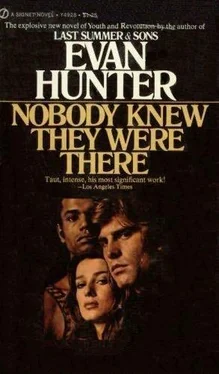Evan Hunter - Nobody Knew They Were There
Здесь есть возможность читать онлайн «Evan Hunter - Nobody Knew They Were There» весь текст электронной книги совершенно бесплатно (целиком полную версию без сокращений). В некоторых случаях можно слушать аудио, скачать через торрент в формате fb2 и присутствует краткое содержание. Город: New York, Год выпуска: 1971, ISBN: 1971, Издательство: Doubleday & Company, Жанр: Проза, на английском языке. Описание произведения, (предисловие) а так же отзывы посетителей доступны на портале библиотеки ЛибКат.
- Название:Nobody Knew They Were There
- Автор:
- Издательство:Doubleday & Company
- Жанр:
- Год:1971
- Город:New York
- ISBN:978-0094575004
- Рейтинг книги:4 / 5. Голосов: 1
-
Избранное:Добавить в избранное
- Отзывы:
-
Ваша оценка:
- 80
- 1
- 2
- 3
- 4
- 5
Nobody Knew They Were There: краткое содержание, описание и аннотация
Предлагаем к чтению аннотацию, описание, краткое содержание или предисловие (зависит от того, что написал сам автор книги «Nobody Knew They Were There»). Если вы не нашли необходимую информацию о книге — напишите в комментариях, мы постараемся отыскать её.
Nobody Knew They Were There — читать онлайн бесплатно полную книгу (весь текст) целиком
Ниже представлен текст книги, разбитый по страницам. Система сохранения места последней прочитанной страницы, позволяет с удобством читать онлайн бесплатно книгу «Nobody Knew They Were There», без необходимости каждый раз заново искать на чём Вы остановились. Поставьте закладку, и сможете в любой момент перейти на страницу, на которой закончили чтение.
Интервал:
Закладка:
“If you’re so goddamn worried, come on home and take care of it yourself.”
“I can’t Eugene. Will you keep trying him in Boston?”
“Yes, I’ll keep trying him in Boston.” Eugene hesitates. “Where can I reach you, Sam?”
“Ah-ah, counselor. Transparent ploy. I’ll call you at home tomorrow morning.”
“I'll be out tomorrow morning. It’ll have to be tomorrow afternoon. What do you want me to ask David?”
“Find out what his friend is planning to do. And ask him if he got rid of that stuff in his apartment”
“What stuff?”
“He’s got marijuana in his apartment. I’m afraid the Boston police may come around with a search warrant.”
“Dumb bastards,” Eugene says. “Why don’t they leave the kids alone?”
“Yeah, why don’t they? Eugene?”
“Yes, Sam.”
“Will you call him?”
“Of course I will.” He pauses. “Have you talked to Abby?”
“Yes.”
“Sam… is this something I can… I can offer personal advice on?”
“I don’t think so, Eugene. Thanks.”
“It’s not another woman, is it?”
“Why does everyone think the only motive in the world is another woman?”
“When a man suddenly leaves without so much as…”
“Eugene, did you know that in certain primitive cultures, when a man turns forty, he packs up his belongings, picks up his staff, leaves his wife, his family, and his tribe, and goes off into the hills alone? Did you know that?”
“Sam, did you know that in certain primitive cultures, men shove animal bones through their lips and oysters up their ass? Did you know that?”
“No, I didn’t know that.”
“Where are you, Sam?”
“I’ll call you tomorrow afternoon, Eugene. Thanks again.”
It is snowing when I go out for lunch.
The town is still. The university streets have been covered by the silent fall, and all is still save for the sound of automobiles jingling by on tire chains. There is a sense of false peace. It causes me to wonder for only a moment why I am here to do murder.
The university students hurry past, their footfalls hushed.
I am followed to the restaurant, but when I head back for the hotel later, there is no one waiting for me. I am surprised. I check both directions. I scan the hallways across the street. No one. The snow has stopped, and it is bitter cold now. Perhaps the temperature has driven my tail indoors.
In the hotel room, everything looks just as I left it. The telephone, a blank pad, and a pencil are on the bedstand. The pillow is propped up against the headboard. I go to the dresser. My socks and handkerchiefs are in the top drawer. My shirts and undershorts are in the middle drawer. The bottom drawer contains the two nightshirts I brought with me. In the closet, my check jacket and my brown suit are hanging side by side, near my raincoat A pair of brown shoes are on the floor. Four ties and a brown belt are on the door hook. I go into the bathroom. Toothbrush, toothpaste, and soap are on the counter top. Razor, shaving cream, spray deodorant, and comb are in the cabinet. Everything seems in its place, exactly the way I left it. But I cannot shake the certain feeling that someone has been in this room during my absence. I go to the bed and sit on its edge. I lift the telephone receiver and wait until the law student behind the desk answers.
“This is Mr. Sachs in 506,” I tell him. “Were there any calls for me while I was out?”
“No, sir,” he answers. “No calls.”
“Any visitors?”
“There was a young man asking for you.”
“Did he leave his name?”
“No, sir.”
“What did he look like?”
“He was a tall black man, sir.”
“Wearing a fleece-lined jacket and a Stetson?”
“That’s the man.”
“Did he say what he wanted?”
“He asked whether you were registered, and I told him you were, and he asked me what room you were in, and then went to the house phone.”
“To call me?”
“I assume so, yes, sir.”
“Thank you.”
“Not at all, sir.”
I replace the receiver on its cradle. I do not recall having written anything on the telephone pad, and yet there is a faint impression on its blank surface. I take the pencil in my hand and shade the marks with graphite until a number appears white against the gray: WH 3-5598. I recognize the number at once, and feel suddenly violated. I go immediately to my briefcase and open it. There are a small stack of office envelopes and at least a dozen sheets of stationery in the bag. I remove the top sheet and stare at the letterhead,
Stacked behind these dozen-odd sheets of blank, incriminating pages, typed on the flimsy favored by some investigators, are the reports on each of the persons in the plot I take one out of the bag. My hand is shaking.
University Professor. Bom Boston. Massachusetts, December 23, 1907. Son of William and Cora Terry (Sears). Graduate Phillips Exeter Academy, 1925. A.B., magna cum laude, Princeton U., 1929; M.A., 1930; Ph.D., Western Methodist U., 1952.
Married Virginia Riggs, September 11, 1932. Children: Edward. Married 2nd Charlotte Merritt, July 14, 1942. Children: Michael and Janice Kay (Mrs. Robert Stark).
Enlisted U. S. Army, 1933, promoted through grades to colonel. 1945. Flying Cadet, 1933-34; served with 9th Bomb Group. Mitchel Field, N.Y., 1934-38. 5th Bomb Group, Hickam Field, Hawaii. 1938-41. 389th Bomb Group, Norwich, England, 1943-45. Decorated with Silver Star, Purple Heart.
Assistant and Fellow in Politics, Princeton U., 1930-32. Assistant Professor Govt., Western Methodist U., 1946-48. Associate Prof., 1948-53. Professor, 1954-56. Chairman Dept. Govt., 1956 to present. Member: American Assn. Univer. Profs. (Nat. Council, 1960-63), American Academy Political and Social Sciences, Lambda Chi Alpha, Phi Beta Kappa.
Author: The Foundations of American Government , 1948; The Highest Court, 1951; Steps to Equality , 1958. The American Crisis, 1964; Dilemma of the New Politics, 1969; The Constitutional Challenge, 1972.
Cornelius Raines is sixty-seven years old, lives alone in English Tudor house outskirts of campus. He is a man of fixed habits and routine, perhaps because of years spent in the military. An early riser, he programs his classes (teaches two each day) for mornings, walks to and from Yates Hall rain or shine, despite limp result of war injury.
Former wife, Virginia, now remarried Brigadier General Richard Unger, U.S.A.F. (Ret.), living Spokane. Washington, reluctant discuss Raines until convinced he candidate for achievement award Citizens Union. Spoke without rancor early days of marriage when Raines thought Army career preferable to low-income job during Depression era. First child Edward (now physician, Boulder. Colorado) already bora when Raines enlisted Army, September 1933, after two years fellowship Princeton while beginning doctoral studies — not completed till 1952, Western Methodist. He twenty-seven years old when commissioned second lieutenant in Army Air Corps, left service 1945, rank of colonel. He and Virginia divorced 1939, long before Raines returned mainland from Hickam Field. Virginia knew nothing at all about second wife, though had feeling she was girl Raines met while stationed in England. Subsequent investigation proved her mistaken, Raines met Charlotte Merritt at Western Methodist where he had gone to visit his brother (since deceased) after transfer from Hickam and awaiting new orders. Charlotte, instructor at university, married him 1942, stayed on as assistant professor when he was sent to activated 389th in December.
Читать дальшеИнтервал:
Закладка:
Похожие книги на «Nobody Knew They Were There»
Представляем Вашему вниманию похожие книги на «Nobody Knew They Were There» списком для выбора. Мы отобрали схожую по названию и смыслу литературу в надежде предоставить читателям больше вариантов отыскать новые, интересные, ещё непрочитанные произведения.
Обсуждение, отзывы о книге «Nobody Knew They Were There» и просто собственные мнения читателей. Оставьте ваши комментарии, напишите, что Вы думаете о произведении, его смысле или главных героях. Укажите что конкретно понравилось, а что нет, и почему Вы так считаете.












